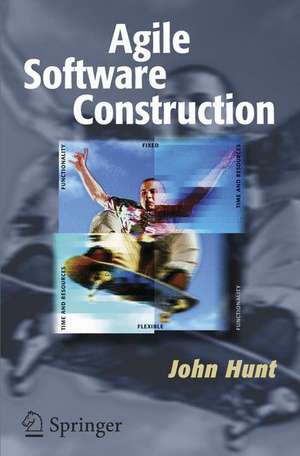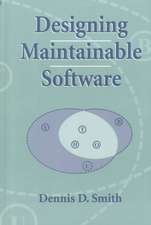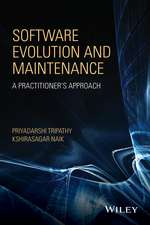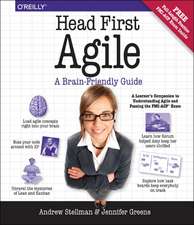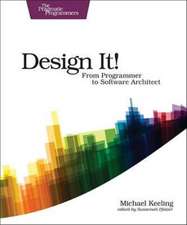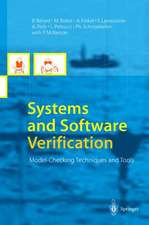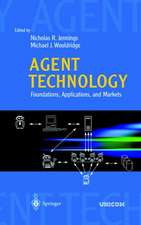Agile Software Construction
Autor John Hunten Limba Engleză Paperback – 25 oct 2005
This book covers the emerging methods and approaches (including extreme programming, feature-driven development and adaptive software development), that are loosely described as "Agile" and shows how to apply them effectively to software development projects. It shows how to plan, organise and develop systems using agile techniques, and highlights some of the problems that may be encountered.
This down-to-earth approach looking at how the different methods can work together, will be welcomed by software developers, architects and engineers, business analysts, development managers and software professionals needingan accessible source of Agile techniques and applications.
Preț: 331.08 lei
Preț vechi: 413.85 lei
-20% Nou
Puncte Express: 497
Preț estimativ în valută:
63.36€ • 65.90$ • 52.31£
63.36€ • 65.90$ • 52.31£
Carte tipărită la comandă
Livrare economică 14-28 aprilie
Preluare comenzi: 021 569.72.76
Specificații
ISBN-13: 9781852339449
ISBN-10: 1852339446
Pagini: 266
Ilustrații: X, 254 p. With online files/update.
Dimensiuni: 155 x 235 x 15 mm
Greutate: 0.38 kg
Ediția:2006
Editura: SPRINGER LONDON
Colecția Springer
Locul publicării:London, United Kingdom
ISBN-10: 1852339446
Pagini: 266
Ilustrații: X, 254 p. With online files/update.
Dimensiuni: 155 x 235 x 15 mm
Greutate: 0.38 kg
Ediția:2006
Editura: SPRINGER LONDON
Colecția Springer
Locul publicării:London, United Kingdom
Public țintă
Professional/practitionerCuprins
Agile Methods and the Agile Manifesto.- Agile Modelling.- How to Become an Agile Modeller.- Extreme Programming (XP).- Putting XP into Practise.- Agile Modelling and XP.- Agile Modelling and XP Reviewed.- Feature-Driven Development.- Planning a Sample FDD Project.- Agile Methods with RUP and PRINCE2.- Introducing Agile Methods into Your Organisation.- Tools to Help with Agile Development.- Obstacles to Agile Software Development.
Recenzii
From the reviews:
"A very comprehensive guide to the most popular current agile methods. The author fully succeeds in bringing together, in a very concise style, not only the essential approaches and methods … but also the necessary tools for a more effective application of agile methods in the real software development process. … By its content, the book addresses the software development theorists and practitioners alike. By its style, it is an excellent guide for any kind of student interested in achieving skills for agile software construction." (Tudor Balanescu, Zentralblatt MATH, Vol. 1095 (21), 2006)
"Cyberneticians, systemists and software users and also developers will welcome a text that, says the publishers, focusses on the realities within which most software projects have to work. This appears to be useful addition to the literature and is branded as exhibiting the author’s ‘down-to-earth’ approach when he examines how different methods can be worked together for successful results. It is an easy-to-use book that provides ‘an accessible source of Agile techniques’ as well as useful applications." (W. R. Howard, Kybernetes, Vol. 35 (7-8), 2006)
"A very comprehensive guide to the most popular current agile methods. The author fully succeeds in bringing together, in a very concise style, not only the essential approaches and methods … but also the necessary tools for a more effective application of agile methods in the real software development process. … By its content, the book addresses the software development theorists and practitioners alike. By its style, it is an excellent guide for any kind of student interested in achieving skills for agile software construction." (Tudor Balanescu, Zentralblatt MATH, Vol. 1095 (21), 2006)
"Cyberneticians, systemists and software users and also developers will welcome a text that, says the publishers, focusses on the realities within which most software projects have to work. This appears to be useful addition to the literature and is branded as exhibiting the author’s ‘down-to-earth’ approach when he examines how different methods can be worked together for successful results. It is an easy-to-use book that provides ‘an accessible source of Agile techniques’ as well as useful applications." (W. R. Howard, Kybernetes, Vol. 35 (7-8), 2006)
Textul de pe ultima copertă
In every software development project there is a need to ensure that the requirements of the user are met without compromising the ultimate goal of the project. However these needs frequently change, and are often erratic. Agile software is a means of putting the software first while at the same time reacting to these user requirements in a flexible and agile way.
Agile Software Construction covers the emerging methods and approaches (including extreme programming, feature-driven development and adaptive software development), that are loosely described as "Agile" and shows how to apply them effectively to software development projects. It shows how to plan, organise and develop systems using agile techniques, and highlights some of the problems that may be encountered.
There are very few books available that focus on the realities within which most software projects have to work, and most concentrate on one particular method. John Hunt’s down-to-earth approach looking at how the different methods can work together, will be welcomed by a range of readers including software developers, business analysts, development managers, software architects, software engineers and product architects involved with software development, and software professionals needing an accessible source of Agile techniques and applications.
Agile Software Construction covers the emerging methods and approaches (including extreme programming, feature-driven development and adaptive software development), that are loosely described as "Agile" and shows how to apply them effectively to software development projects. It shows how to plan, organise and develop systems using agile techniques, and highlights some of the problems that may be encountered.
There are very few books available that focus on the realities within which most software projects have to work, and most concentrate on one particular method. John Hunt’s down-to-earth approach looking at how the different methods can work together, will be welcomed by a range of readers including software developers, business analysts, development managers, software architects, software engineers and product architects involved with software development, and software professionals needing an accessible source of Agile techniques and applications.
Caracteristici
There are no Agile method books around which acknowledge the realities within which most software projects have to work (such as imposed by methods such as PRINCE) Additionally, most books focus on one particular approach (such as XP or Agile Modelling) This book tries to take a more realistic look at how the different methods can work together within real development projects
